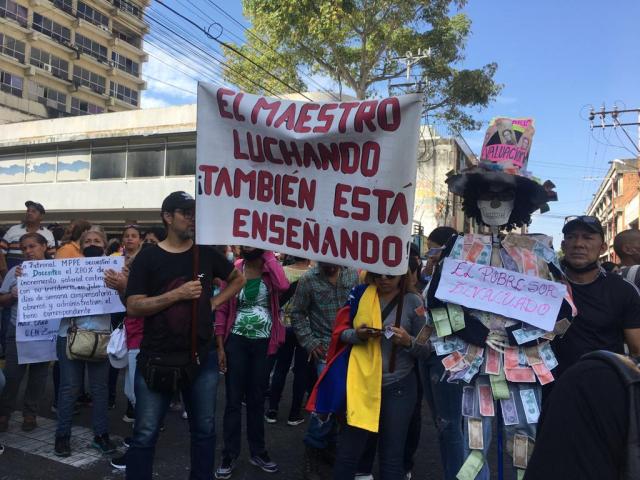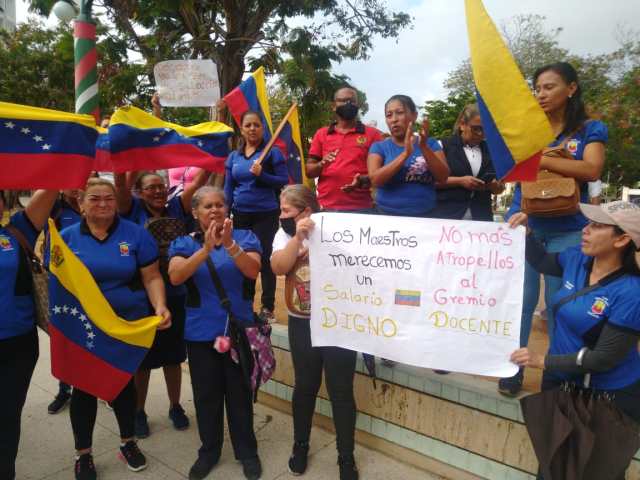
After more than a month after the start of the nationwide protests by the teachers’ union demanding better wages from Nicolás Maduro’s regime, the street demonstrations have not stopped. However, the dynamics have been changing and the teachers now divide the week between fighting in the streets and their activities inside the classroom due to threats from superiors.
Correspondent lapatilla.com
In Mérida, teachers teach two or three days a week. When union leaders call for protest, parents and representatives do not send their children to school as a measure of support for teachers. While in Táchira State, some public schools have resumed classes.
In Zulia State, this week they chose to hold assemblies in schools and give classes twice a week. Before this method was used, teachers sent assignments via WhatsApp and students came to campus once a week to deliver them.
In Bolívar State, education professionals agreed on the modality of one day of protest and one day of classes.

In Sucre they hold protests three days a week and the other two days they spend visiting the communities and meeting with student representatives. Classroom activities have not been resumed 100%.
In Anzoátegui, teachers denounced that they have received threats from supervisors, which is why some, for fear of losing their jobs, decided to resume classes on campus. However, in other schools, professionals go to their jobs only to sign attendance or finish activities at 10 in the morning.
In Nueva Esparta, protests are taking place twice a week in each of the municipalities, because some teachers could not attend the demonstrations in Porlamar and La Asunción due to lack of money to pay for the bus fare.
In some schools in Greater Valencia, teachers give classes two or three times a week. Union leaders denounced that managers and supervisors are sanctioning teachers who do not comply with the regular hours in schools.
On the other hand, in the West of Carabobo, the call to classes by government managers is maintained in these municipalities, but the classrooms remain desolate. There are grades where only four children per classroom attend, which does not allow the teacher to give new material because the majority is not there.
In the “San Rafael de Bejuma EU”, of the Venezuelan Association of Catholic Education (AVEC), which is private but subsidized by the government, is where the children as of this week have been incorporated, because in an assembly the student’s representatives were informed that the campus ran the risk of being left without the benefit provided by the State if classes did not restart.
In Barinas, the Pedro Elías Gutiérrez school, located in Los Guasimitos, Obispos Municipality, and the Julían Pino school, in Sabaneta, Alberto Arvelo Torrealba Municipality, were the only ones reported with educational activities during this week. Doranny García, director of the Venezuelan Teachers Union (Sinvema), said that the staff of 98% of the educational institutions, is dedicated to the street actions, exercising their labor rights in all the municipalities.
In Apure State, some schools resumed 100% activities. Teachers have expressed discouragement after they migrated state teachers to the Ministry of Education.
Since last January 9th, teachers from different regions of the country have been protesting with three main demands of Maduro’s regime: a salary increase in accordance with article 91 of the Constitution, signing of the collective contract and the payment of debts of the previous convention.
In March 2022, Maduro set the minimum wage at 130 bolivars, which at that date was equivalent to about $30. Now, due to inflation, that figure has been reduced to about $5 (U.S. dollars a month).
According to estimates from the Center for Documentation and Social Analysis of the Federation of Teachers (Cendas-FVM), the food basket in December 2022 stood at $485.06, the equivalent of 63.24 minimum wages for that month.

